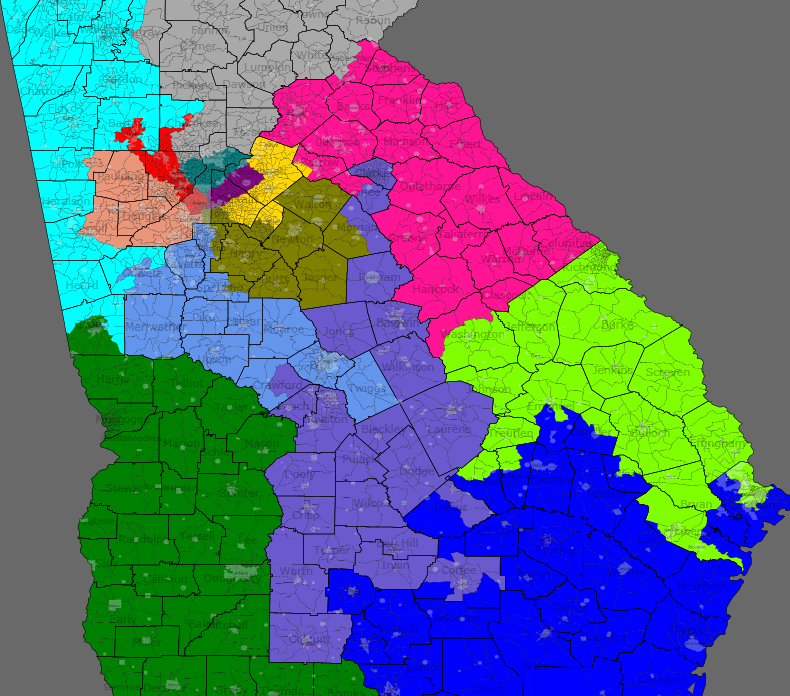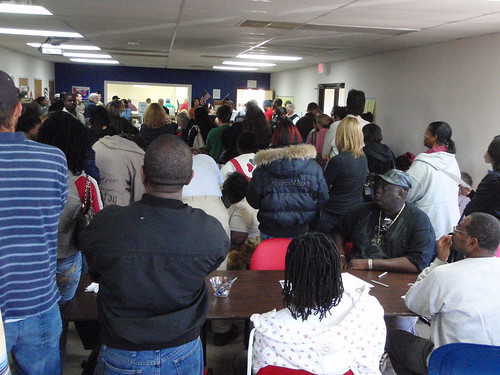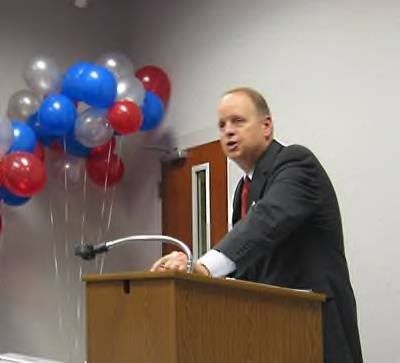Episode 4 in my series of diaries mapping out possible redistricting scenarios in the states is here! I was inspired to finally put it together after BigTentProgressive’s excellent Texas redistricting diary. On the agenda today: some peaches for the First Lady’s new garden. (Which is my not-so-clever way of saying that I’m covering Georgia and New Jersey in today’s diary.)
Previously covered:
Diary 1: Massachusetts and Texas
Diary 2: Michigan and Nevada
Diary 3: Iowa and Ohio
Unfortunately, my districts are based on county estimates from 2007, and just this week the Census released 2008 numbers. Since my maps were drawn before the 2008 release, they are worth taking with a grain of salt. Also, I am using projected seat totals for post-2010 redistricting that are equally subject to change.
Geeky playtime below the fold!
Georgia
Sadly for those of us who live here, there is close to zero chance of a Democratic takeover in the legislature and only an outside chance of snagging the open governor’s mansion in 2010, as the Dem bench has become thinner and thinner since the state GOP’s rebirth in 2002. So I drew this map with a GOP gerrymander in mind, and as a result, it doesn’t look dramatically different than the 2005 map currently in place. With the Atlanta area providing the vast majority of growth in the state, a new 14th District is likely to be carved out of suburban counties, and should lean Republican given who will be drawing the lines.
One wrinkle to the plan in this state: the Supreme Court’s ruling in Bartlett v. Strickland means that the 2nd, 12th, and 13th Districts, all with black populations around 40-45%, will not be considered protected by the Voting Rights Act for purposes of future redistricting. Now, Sanford Bishop and David Scott are both black and have never been GOP targets, but John Barrow could be a casualty in future cycles (since his seat is under 50% black, the Supreme Court would not consider it VRA-protected). The real question is, would GOP mapmakers gerrymander Barrow’s district for a white Republican, or for a black Democrat? Given the sensitivity of the issue, and the need not to spread GOP votes too thin, I’m guessing the latter option would be more likely in this case, so I clearly tried to increase the 12th’s black % by including more of Augusta.
Barrow’s seat should stay Dem-leaning, probably getting even more so as its black population is boosted. Bishop, Johnson, Lewis, and Scott will all be protected by a GOP-drawn map (though I couldn’t figure out how to make Scott’s a VRA African-American seat as long as it resembles its current form). Then, of course, there’s Jim Marshall. Knowing Republicans will try again to mess with him, I cut out Dem-trending Newton County and added some rural Middle Georgia turf with the aim of getting his 8th District to be about 60% McCain instead of 56%. But as long as his Macon base isn’t split, it’s hard to make the 8th much more inhospitable. (One obvious option I didn’t consider to endanger Marshall: trade some of his southern turf with Jack Kingston, whose seat is already ridiculously safe. Perhaps only a real Republican would think of these things.)
Anyway, Marshall aside, the other five Dem seats are as safe as before, if not safer.
Enough ado, here it is:

District 1 – Jack Kingston (R-Savannah) — my Representative (cringe) will have the most heavily Republican seat south of the Appalachian hills. Savannah’s east side and islands do lean Republican, but it’s really the many rural counties of South Georgia that cause my travesty of congressional representation.
District 2 – Sanford Bishop (D-Albany) — may be right on the threshold of 50% black, but either way, it stays at least 54-45 Obama, somewhat rural but anchored in Columbus and Albany, and doubtlessly safe for Bishop.
District 3 – Lynn Westmoreland (R-Grantville) — these are some of the most Republican counties in the Atlanta area, so perhaps some of them could be reserved for the new 14th, but I found that after finishing the 13 incumbents, there was leftover population east of the city, not west of it.
District 4 – Hank Johnson (D-Lithonia) — still majority-black and overwhelmingly Democratic, but now entirely within DeKalb County.
District 5 – John Lewis (D-Atlanta) — also majority-black and overwhelmingly Democratic, but now entirely within Fulton County.
District 6 – Tom Price (R-Roswell) — probably remains the most educated and wealthy district in the state, and despite Democratic trends in Cobb and north Fulton, the whole inclusion of Cherokee County will protect Price and future Republicans here.
District 7 – John Linder (R-Duluth) — entirely within Gwinnett now, safe for him (for now) but trending the other way long-term. I guesstimate that McCain would have won only 54-57% in this district, so the GOP would probably draw it a bit differently than I, but there’s no escaping the inevitable: whether it involves Linder’s retirement or a competitive new 14th, eventually there will be a Democrat representing the eastern suburbs as long as the area continues its long-term diversification.
District 8 – Jim Marshall (D-Macon) — a bit more Republican than before; Marshall might survive in this conservative and military-heavy district, but a future Democrat probably wouldn’t.
District 9 – Nathan Deal (R-Gainesville) — some of the most conservative territory anywhere is in Appalachian North Georgia, so Deal gets the “safest Georgia Republican” prize.
District 10 – Paul Broun (R-Athens) — I hate Athens being in this hard-right district, but Republicans quite like the arrangement.
District 11 – Phil Gingrey (R-Marietta) — with Cobb County trending Democratic long-term, Gingrey can take solace in the rest of his district, with fast-growing but very conservative Paulding County now a secondary population base.
District 12 – John Barrow (D-Savannah) — intending to increase the black percentage here, I give Barrow 71% of Chatham and 83% of Richmond. Though Barrow is getting entrenched, a credible black primary challenger could give him a run for his money, and as an open seat this would be good territory for a black pol from either Augusta or Savannah. In any case, the district’s Obama percentage should be boosted a couple points into the high 50s.
District 13 – David Scott (D-Atlanta) — this is an ugly and meandering shape, but my intent was to keep fast-growing eastern suburbs together in a GOP seat and consolidate Scott’s Atlanta base. I don’t know the black population in this district (can’t be much more than 40-45%), but including the entirety of Clayton County, and 13% of Fulton, can’t hurt. Though it holds 66% of somewhat GOP-leaning Henry County, the other suburban areas are fairly Dem-friendly (25% of Douglas County, Smyrna and other towns in eastern Cobb).
And the new District 14 – runs clockwise from Forsyth County down to Henry County — the long-term trends in this district are blue, at least in its southern half, but with deep-red Forsyth the largest source of population, Republican X should be fine for a few cycles at least. As long as Gwinnett and Henry stay in the GOP column, Democrats can only make so much headway here by winning Newton and Rockdale. My guess is the 2008 vote would have been about 60-40 McCain here.
So the end result is an 8-6 GOP delegation if Marshall survives, 9-5 if he doesn’t. Now if only I could figure out how to put my home in Barrow’s district without disrupting the 12th’s delicate VRA balance…
New Jersey
In New Jersey, the game is rather different. A bipartisan/independent commission draws the lines, but unlike in Iowa, political considerations are very present in the mapping process. This being a bipartisan effort, incumbent protection is a top priority. My map focused on protecting all incumbents, especially two in South Jersey (Dem John Adler, whose district under my proposal would be about as solidly Democratic as Rob Andrews’, and Republican Frank LoBiondo, whom I gave the most Republican district I possibly could). I kept Albio Sires’ seat VRA Hispanic and Don Payne’s VRA African-American.
The pinch is this: New Jersey is expected to shed a seat, for a new total of 12. I was initially planning to force together two North Jersey Dems (Bill Pascrell and Steve Rothman) then thought to instead put together two Republicans (Rodney Frelinghuysen and Leonard Lance), but realized that a bipartisan commission would likely seek a bipartisan fight. Thus my North Jersey districts are a bit ugly, especially Rothman’s 9th, but the solution was reached: Pascrell vs. Frelinghuysen in the new 8th, which probably would have favored Obama by a fair amount but is otherwise something of a swing district.
Again, apologies to Steve Rothman for the messy lines. He’s the new Frank Pallone in terms of representing an emaciated serpent in Congress:

District 1 – Rob Andrews (D-Haddon Heights) — still safely Democratic, but less so to help Adler, who would now represent 58% of Camden County, the home county of both Congressmen.
District 2 – Frank LoBiondo (R-Ventnor) — dominated by Ocean and Atlantic Counties, the most heavily Republican seat I could possibly carve out of South Jersey. It probably voted for McCain, though not by a lot, which is an improvement for the incumbent from a 54-45 Obama seat. Unlike before, Republicans would have a great shot at holding the 2nd when LoBiondo retires.
District 3 – John Adler (D-Cherry Hill) – 58% of Camden and 96% of Burlington = a safe seat.
District 4 – Chris Smith (R-Hamilton) — would now be not just more Republican, but more conservative too.
District 5 – Scott Garrett (R-Wantage) — sorry, folks, unless he’s a candidate for elimination, Garrett will be made safe by any commission-approved plan.
District 6 – Frank Pallone (D-Long Branch) — you must admit that these lines make a lot more sense.
District 7 – Leonard Lance (R-Clinton Township) — I attempted to pick up if not the more Republican areas of North-Central Jersey, then at least the less Democratic ones. The current 7th only narrowly voted for Obama and I think what I constructed may have (barely) voted for McCain, but there’s only so much that can be done for an incumbent with a district trending the other way. For Lance’s sake, he should work to maintain a moderate reputation.
District 8 – Bill Pascrell (D-Paterson) vs. Rodney Frelinghuysen (R-Morristown) — this is something of a quintessential North Jersey seat, with 67% of Pascrell’s home Passaic County, 59% of Frelinghuysen’s Morris, and the leftover 11% of Bergen. Since both Reps. have seniority and entrenched House careers under their belts, the real question is whether this district is liberal enough for Pascrell or conservative enough for Frelinghuysen. I have no idea how a real race would unfold here.
District 9 – Steve Rothman (D-Fair Lawn) — gerrymandered not for political expediency (Rothman has a safe seat, no question about it), but for pure numerical equalization.
District 10 – Donald Payne (D-Newark) — should still be majority-black and heavily Democratic.
District 11 – Rush Holt (D-Hopewell Township) — in the last round of redistricting, protecting Holt was the first consideration. Since his current district voted 58-41 for Obama, there’s little concern there, so my intent was to keep the district Dem-leaning and make it a little more compact.
District 12 – Albio Sires (D-West New York) — probably close to 50% Hispanic now due to demographic changes anyway, and including the leftover 27% of Union County shouldn’t much harm the district’s VRA legal status, particularly with all of Hudson County preserved in my proposed configuration.
11 incumbents are safe (most of them safer than before) in my plan, and the only real popcorn-worthy fight would be in the new 8th. New Jersey is one of the states I am least knowledgeable about demographically, so I’d greatly appreciate some insight into my hypothetical Pascrell/Frelinghuysen contest.




 Jack Kingston has
Jack Kingston has 